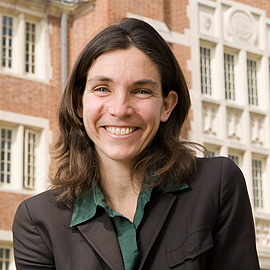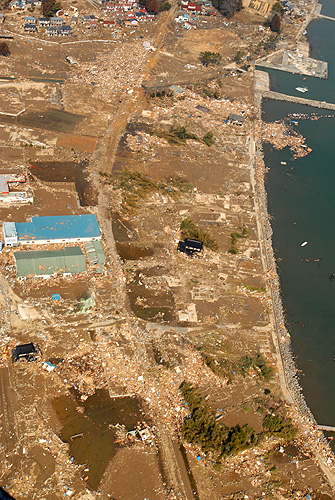This essay is contributed by Alexis Dudden, a Japan scholar in the History Department, College of Liberal Arts and Sciences. Dudden, who spent 2009-10 in Niigata, Japan, on a Fulbright Research Fellowship, is currently in Japan with her family. They hope to be back in Connecticut on Friday, March 18, traveling via Osaka.

My five-year-old son and I were on a train on the southern island of Kyushu when the earthquake hit off the northeastern coast of Japan, about 600 miles away from where we are. There was an announcement on the train, but no real concern, as such announcements are fairly routine in Japan.
When we reached our hotel an hour later, however, the news was already covering the tsunami hitting the coasts. The reports have been awful. The devastation is tremendous, and while the dead and missing count remains officially at around 6,000, everyone seems to be preparing for that number to reach 20,000-30,000.
Then the Fukushima nuclear plant started to melt, and two of its five reactors have had explosions. A third is set to go. A 20-kilometer evacuation zone is in place around the plant, about 30 people have suffered severe radiation sickness and likely three have been killed.

The whole disaster has reached a nightmarish level of natural and man-made catastrophe that will embroil Japan for years to come. Tokyo is experiencing rolling blackouts as the power plant – 280 miles from Tokyo – sent most of its product to the capital. Trains were shut down again yesterday, stranding millions, yet the market and businesses remained open so people feel compelled to walk hours to get to and from work.
The pictures of the tsunami rolling in and elderly people trying to make it up hills are very sad, as was a story in the Mainichi paper this morning about a young mother who discovered her baby son dead in his grandmother’s arms. Their house in shattered splinters around them. The uneasy part of all this to me is that the nuclear news is eclipsing these smaller stories.
My family and I had planned to go to Tokyo later this week, even though we knew we would have to bring flashlights and as much water as we could carry. But because of rising radiation levels, which clearly are getting worse, we will travel instead to Osaka and leave for the States from there.
The combination of tsunami horror and nuclear disaster most certainly is producing a national emergency on the scale of 9/11. But the government is responding with surprising openness, and while that cannot stem the tides of devastation, it is certainly a fresh difference in Japan.
For information on how to contribute to disaster relief in Japan, go to the CNN website.
To learn more about Dudden’s research, listen to this podcast about her recent book, Troubled Apologies Among Japan, Korea and the United States.


